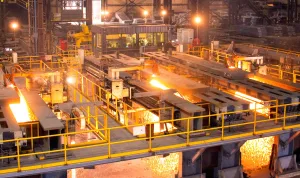How Global Economic Conditions Shape Steel Prices in Hong Kong: Key Factors and Insights

Hong Kong’s steel market is intricately linked to global economic trends. As a city heavily reliant on imported steel, fluctuations in global markets have a direct impact on local steel prices. This, in turn, affects Hong Kong’s construction, manufacturing, and infrastructure projects. In this article, we’ll explore how global economic conditions influence steel prices in Hong Kong and examine the key factors driving these fluctuations.
1. Global Supply Chains and Steel Imports
Hong Kong imports a significant portion of its steel from countries like Mainland China, Japan, and South Korea. Any disruptions in these supply chains can lead to sharp changes in steel prices locally.
Factors like global shipping delays, trade disputes, or geopolitical tensions can limit steel supply, causing prices to rise. For example, the 2020 COVID-19 pandemic disrupted international trade routes, leading to a slowdown in steel imports. As a result, construction and infrastructure projects in Hong Kong faced delays due to higher steel prices and reduced availability.
2. Raw Material Costs and International Markets
Steel production is heavily dependent on raw materials such as iron ore, coal, and limestone. The global prices of these materials directly affect steel production costs, which ultimately influence the prices of finished steel products in Hong Kong. For example, when iron ore prices soar due to supply shortages or increased demand, steel manufacturers pass these costs onto buyers, driving up steel prices in Hong Kong.
Additionally, the economic conditions of major steel-exporting countries, such as China or Brazil (key suppliers of iron ore), play a role in determining global steel costs. An economic slowdown in these regions can either reduce production and push prices up, or create an oversupply, driving prices down.
3. Global Demand for Steel
The demand for steel worldwide significantly influences its price in Hong Kong. High global demand for steel, driven by industrial growth in major economies like the U.S., China, and India, leads to increased competition for limited supply, causing prices to rise globally. This directly impacts Hong Kong, where construction and manufacturing industries must compete for steel on the international market.
Conversely, when there is a downturn in global demand—often due to a global economic slowdown—steel prices tend to fall. For example, during the 2008 global financial crisis, demand for steel plummeted, leading to a sharp drop in prices worldwide, including in Hong Kong.
4. Trade Policies and Tariffs
Trade policies and tariffs imposed by major steel-producing nations also have a direct impact on steel prices in Hong Kong. Changes in tariffs on steel imports can either raise or lower the cost of steel. For instance, if the U.S. or China imposes tariffs on steel imports, it can reduce the flow of steel into global markets, tightening supply and driving up prices in other regions, including Hong Kong.
Hong Kong’s status as a free trade zone allows it to benefit from minimal tariffs on steel imports. However, changes in global trade policies, such as those related to China’s steel exports or international trade disputes, can affect pricing trends.
5. Currency Fluctuations and Exchange Rates
Currency exchange rates play a crucial role in determining the price of imported steel in Hong Kong. Since steel is typically traded in U.S. dollars, fluctuations in the value of the Hong Kong dollar (HKD) against the U.S. dollar can affect steel prices locally. When the HKD weakens, the cost of importing steel rises, making construction materials more expensive for local companies.
On the other hand, a stronger HKD can help reduce the cost of imports, creating opportunities for lower steel prices and making large infrastructure projects more affordable.
6. Global Energy Prices
Energy costs are a major factor in steel production. Global oil and natural gas prices affect transportation, mining, and the production processes of steel. When energy prices spike, steel production becomes more expensive, driving up prices for finished steel products.
For Hong Kong, which imports its steel, rising global energy prices can result in higher shipping costs and higher steel prices. Conversely, when energy prices fall, steel becomes cheaper to produce and transport, potentially lowering prices for Hong Kong’s steel market.
7. Environmental Regulations and ESG Pressures
As governments worldwide increase their focus on environmental sustainability, the steel industry faces growing pressure to reduce its carbon footprint. New regulations aimed at reducing emissions or encouraging the use of recycled materials can lead to changes in steel production methods.
In response, steel manufacturers may pass on the costs of complying with environmental regulations to consumers, including buyers in Hong Kong. This trend is expected to continue as ESG (Environmental, Social, and Governance) factors take a more central role in the steel industry.
Conclusion
The steel market in Hong Kong is closely tied to global economic conditions, with international supply chains, raw material costs, and energy prices all playing significant roles in shaping local steel prices. As global markets evolve, Hong Kong’s steel industry must adapt to the fluctuations caused by trade policies, environmental regulations, and currency shifts.
For businesses in Hong Kong’s construction and manufacturing sectors, staying informed about global trends and their impact on steel prices is crucial for navigating the challenges and opportunities in the ever-changing market.



